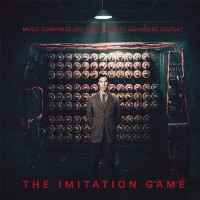- Composed by Alexandre Desplat
- Sony Classical / 2014 / 51m
The Imitation Game stars Benedict Cumberbatch as Alan Turing, the British mathematical genius who cracked the Germans’ codes and played a pivotal part in the Allies winning the second world war, widely considered the father of modern computing and shamefully prosecuted, castigated and chemically castrated in the early 1950s for the crime of being homosexual, before killing himself shortly afterwards (he finally received a posthumous apology from the British government in 2009). The film’s score comes courtesy of Alexandre Desplat, yet again finding himself attached to a critically acclaimed drama just when Oscar season comes around. His bittersweet score is typically excellent, somehow capturing this complex figure just perfectly, starting in the driving opening titles piece, a fine example of this composer’s ability to capture a film’s spirit in a nutshell, getting grit and determination to sparkle through a sense of urgency and importance in the space of two and a half minutes. Later there’s a beautifully warm version in “Mission” and the composer brings things full circle with a rousing arrangement for the finale, “Alan Turing’s Legacy”.
The rest of the score goes to a variety of places as it takes, effectively, a journey through Turing’s mind. Darker ones are coloured with hypnotic piano figures, pizzicato strings doubling staccato bowed ones, sometimes a subtle electronic backdrop (“Enigma”). Elsewhere an incessant rumbling piano ostinato accompanied by wood blocks driving things forward like a train, timpani joining in here and there, the trademark electronic pulse. As a musical depiction of a genius at work, it’s hugely effective. Winds, as is often the case with Desplat, are particularly florid and descriptive, beautifully played too. A secondary theme is introduced in “Alone With Numbers” – there’s a hint of melancholy, a quite profound sadness sweeping through it. “The Machine Christopher” is a dazzling cue, different ideas appearing from all over the place, the gentle chaos brilliantly resolved as the cue progresses. Throughout the whole score there is such clarity to the writing – I never cease to be amazed that a composer of Desplat’s phenomenal orchestral gifts has managed to forge such a successful career in these dumbed-down times. He’s the real deal and The Imitation Game is yet another triumph, emotional and dramatic and a showcase for his phenomenal compositional gifts.
Rating: ****
facebook.com/moviewave | twitter.com/MovieWaveDotNet | amazon.com












After being disappointed by his work from the last couple of years, I am happy to fully enjoy a Desplat score again with The Imitation Game!
This is probably no coincidence given certain elements in it that remind me of Girl With The Pearl Earring, still his best score yet in my opinion.
Desplat is having an excellent 2014. His scores for The Grand Budapest Hotel and Godzilla were superb, along with The Imitation Game. And Unbroken seems very fine too. Maybe this year the Oscar come?
Another solid effort from Desplat this year. Did anyone notice that the opening track has the same melody as one of the tracks from Godzilla?